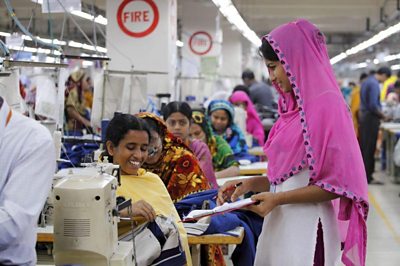Downloads
Publication: January 2023
Behind every female garment worker, there is a βsupportive husbandβ, but what does this support really look like? ΒιΆΉΤΌΕΔ Media Action conducted a study to explore the perceptions and attitudes towards gender roles in the textile industry in Bangladesh.
Context and the project
The garment industry is an important source of economic growth in Bangladesh. Approximately work in this sector and around two-thirds of them are women, however few female workers hold senior positions.
In 2020, funded by the H&M Foundation, the βFuture of Work Gender Norms Pilotβ project was initiated with the goal of expanding the proportion of women in supervisory and tech-oriented roles in the garment manufacturing sector in Bangladesh.
The research
In 2021 we conducted a qualitative study to explore the perceptions and attitudes towards gender roles in the ready-made garment industry in Bangladesh. A total of 57 people participated in the study including; female and male factory workers and their family members, and other factory employees at different levels of seniority.
Data was collected through in-depth interviews (IDIs), key informant interviews (KIIs) and focus group discussions (FGDs).
In particular we focused on the role gender norms play in limiting women workers' growth and ways of positively shifting these norms to help women take up more supervisory or technical roles in factories.
Key findings
We were told, through discussions with garment workers, that most come from low-income families living in rural areas of Bangladesh. Typically they have studied to primary or secondary level and both men and women take jobs to meet financial needs of their family. Although women typically come from similar backgrounds as men, the research highlighted a number of barriers preventing women from progressing as quickly as their male counterparts in the workplace, including:
- Society's views of a woman's role as being a mother and homemaker.
- A lack of female supervisors and those in senior management positions has resulted in many female workers now believing that supervisory/senior work is onerous and reserved solely for men.
- Other factory workers and staff at management level believe that women lack the leadership skills necessary to hold positions of authority, as a result they place female employees in areas where they believe they will be more secure and conducive to their needs.
- Womenβs potential for progress in the workplace appears to be hampered by these stereotypes and beliefs.
Most female garment workers we spoke to told us how supportive their husbands were to start working in the business and how they support them when they work long shifts. They said that cooking, cleaning and washing dishes are just some of the responsibilities that their husbands now shoulder for them.
Do these spouses show their support because they care about their wives' professional advancement?
Insights from our interviews with female workers and their spouses showed that most husbands are supportive of their wives' employment because it is financially advantageous for them. In times of economic hardship, husbands let their wives work in garment factories so they can save money too, for example, build a house or to enable their children to complete their education.
Husbands were reluctant to allow their wives to work outside the home stating that only if the husband's income is insufficient may a woman work outside.
We were told that men ask their wives to leave the job if they have to care for someone else, such as a new-born baby or an ill family member. Husbands may dissuade their wives from accepting promotions because they believe it would mean more time away from the home and less time for family responsibilities.
Study participants said that it is common for husbands to request that their wife leave a job when the family has completed their financial goals with the justification that as a man, they are the breadwinners and should therefore take care of the family's needs.
My wife worked for almost four years and after the financial problem was resolved I told my wife that you did a lot of work, now itβs time for you to rest and do religious deeds, I will work and that will be enough for usβ.
We found that female garment workers also hold the belief that family is their most important priority. E.g. a husbandβs request to take on employment, not accept a promotion, and/or quit a job are followed because they believe it is in the best interest of both the husband and wife to do so.
I told my husband that I was offered the supervisor post, but he asked me not to accept that post because Iβm not going to continue my work in the factory after few years.β
Key implications
These gender norms and stereotypical roles, adopted by female workers and their husbands, appears to curtail women's advancement in the textile industry. Media could play a role by addressing these beliefs and norms while highlighting the potential benefits to women and their families of female progression in the workplace. This could greatly support the professional development of women in this industry.
Our research library
-

Long reads
Read our comprehensive research reports of the evidence behind our work. All of our publications are freely available to download. -

Short reads
At a glance, explore key findings and evidence behind our work. All of our publications are freely available to download. -

By country
Explore our findings and analysis country by country. All of our publications are freely available to download. -
 What are young Bangladeshi's most worried about? Are rural Kenyans interested in politics? Do Palestinian women trust the media? Find the answers in our data portal (last updated 2020).
What are young Bangladeshi's most worried about? Are rural Kenyans interested in politics? Do Palestinian women trust the media? Find the answers in our data portal (last updated 2020).
